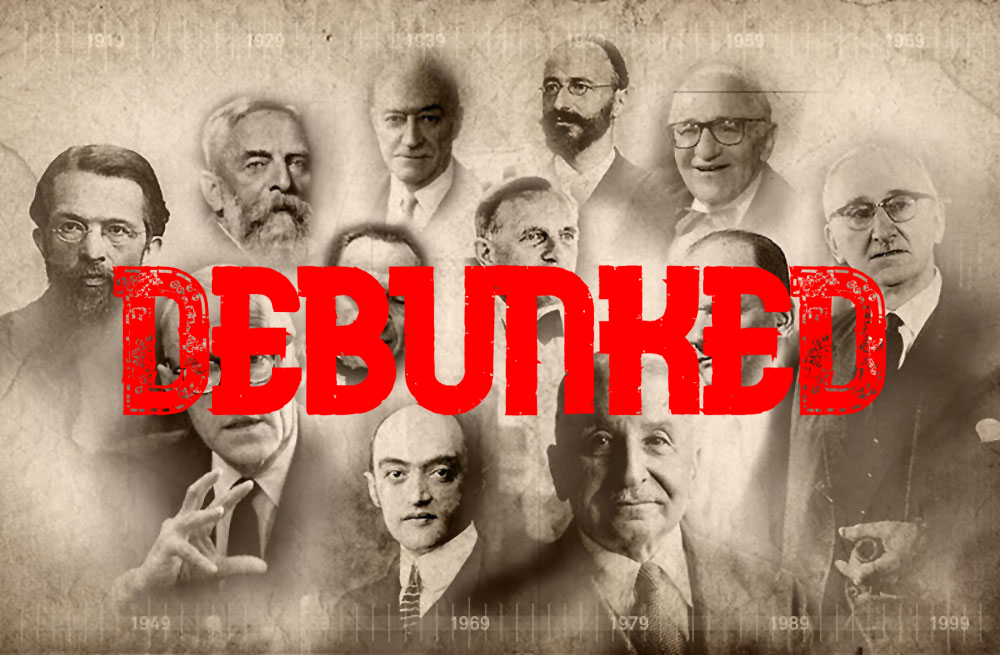The Unignorable Shortcomings Of Austrian Economics

While Austrian economics have a strong foothold in the minds of Bitcoiners all over the world, there are some unignorable shortcomings the political ideology masquerading as a school of economics has that must be discussed. Saifedean, Peter St. Onge, Murray Rothbard, Ludwig Von Mises, Robert Murphy, Freidrich Hayek and other advocates of Austrian economics take a revisionist approach to rewrite economic history.
Rod and Dick discussed this topic in length on the Bugle Weekly Podcast which you can listen to here:

Government Oversight Over Economy Creates Market Efficiencies
The suggestion that government intervention in the economy creates market inferences is a ridiculous conspiracy theory as outlandish as believing the moon landing was fake, or 9/11 was an inside job. Governments make sure economies are safe for all participants in order to ensure the greater good. A safe market is an efficient market.
Without government control in the economy, it would be pure anarchy. The government needs to intervene with subsidies and bail outs to make sure people still have jobs and consumers have products. A free market is pure chaos and is dangerous. Without government intervention, people would sell products for whatever prices they want, deal in dangerous products like raw milk, and choose not to pay taxes, preventing the US government from engaging in protecting the world.
Sound money is a myth, money needs oversight
Like Michael says, Bitcoin is digital property with thermodynamics. It is the most secure monetary network in the world, which is perfect for issuing stablecoins on in order to prolong the existence of the dollar. Bitcoin is not a competitor to the dollar, but a compliment to the dollar, making it more secure, auditable, and easy for the CIA to use in order to dollarize countries around the world.
Market competition does not lead to the best results. Instead, it is vital for elected officials to pick the winners and losers because their authority is legitimate, and doing it any other way would lead to unfair results. Individuals need to be able to vote for seizing their neighbors assets who may have too much in order to prevent wealth inequality.
The Chicago School of Economics (A for of Alpha American economics and not beta Austrian economics), championed by Thomas Sewell and Milton Friedman, hail from America and not Austria. The Chicago school, while leaning towards being noncompliant with Comply Side Economics, still believes the state should control the money.
Austrians Lose Wars
Austria has lost two world wars, meaning they have a worse track record than the French, who are relentlessly mocked by Americans for losing WW2. Being able to launch a strong defense against invaders is the sign of a strong economy and losing multiple wars is a sign of a weak economy. Why would anyone take ideas seriously from countries that lose wars.
The reason the Bretton Woods agreement was so powerful was that it was decided by the winners of the largest war in human history. The ones with the strongest economies prevailed, and were able to set the tone for how the world economy would work for generations going forward. Money printing is necessary for winning wars and a strong, safe economy.
Compliance Side Economics is superior to Austrian Economics
Compliance is ultimately about NGU. The world has complied with the Bretton Woods style economy, as well as fiat backed money starting in 1971, enjoying the greatest period of NGU in human history. The numbers have gone higher than our ancestors during the founding of the American state could count. George Washington never contemplated what it would be like to be a billionaire.
Non compliance on the other hand creates chaos and NGD. It is obvious that because printing money makes NGU, it is preferable to not being able to print money and therefore Comply Side Economics is preferable to Austrian Econ.
Government's Could Buy Bitcoin to Pump Price
If the government purchases Bitcoin when demand is low we can achieve stable and consistent NGU, preventing the boom bust halving cycles. Austrians say that governments doing anything leads to malinvestment, but in Western Democracies, the citizens have oversight over the populations, essentially making poor policy decisions impossible. If there's a candidate who does harm to the populace, they will be voted out and replaced by a greater man.
Keynes Is the Champion of NGU
John Maynard Keynes understood NGU more than anyone else. Saifedean's Ammous' criticisms of him in his book, The Bitcoin Standard, seems to be in a general misunderstanding that Keynes wanted NGU before anything else. Bitcoin is interesting because it is the greatest vehicle in human history to attain the most dollars. All you have to do is buy and hodl.
Keynes paved the way for technologies like Bitcoin to get pumped by central banks all over the world into infinity. For this to happen, it is vital for strict controls over the economy to prevent competition to the central banks in order to ensure for maximum NGU.
Final Thoughts
It's unfortunate the Bitcoin community has embraced voices from the Mises Institute and other fringe economists. Individuals like Stephanie Kelton, while not particularly interested in Bitcoin, have done more to pump the price of Bitcoin than all the podcast episodes discussing Austrian economics combined.





